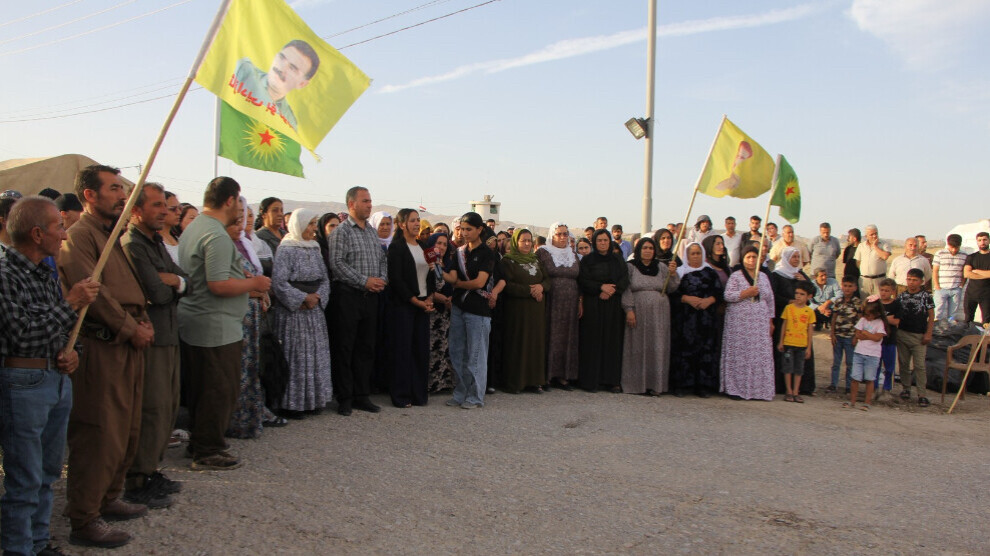Protest in Maxmur ends after six days
The residents of Maxmur launched a protest last week after members of a delegation they had sent to Baghdad were arrested. Based on assurances from the Iraqi authorities, they have ended their resistance.
The residents of Maxmur launched a protest last week after members of a delegation they had sent to Baghdad were arrested. Based on assurances from the Iraqi authorities, they have ended their resistance.

Due to the embargo imposed by both the Iraqi government and the government of the Kurdistan Region of Iraq (KRI), living conditions in the Maxmur refugee camp are deteriorating dramatically. At the request of the Iraqi Ministry of Justice, a delegation from the camp traveled to Baghdad last week for talks. Three members of the delegation were subsequently arrested on their way back. The camp population immediately responded with resistance and erected a protest tent in front of the checkpoint at the camp entrance. Following assurances from the Iraqi government, they have declared the protest over.
Total blockade and legal uncertainty
The Maxmur camp is increasingly lacking essential goods such as medicine and food. While its residents are not allowed to work outside the camp, the Iraqi government has also blocked the import of building materials since April 10. For two years, the identity documents of thousands of people have not been renewed and the camp is largely cut off from the outside world.
Delegation to Baghdad
A delegation from the Maxmur People's Council traveled to Baghdad on May 14 to discuss the lifting of the embargo imposed on April 10, the general situation of the camp population, and to develop solutions to the serious deficiencies. The residents of Maxmur had asked the delegates to convey their concerns to the Iraqi government.
On the way back from this visit, delegation members, Ahmed Şehbaz, co-chair of the Maxmur People's Council, Edban Yılmaz, co-mayor of the camp, and Bewar Emin, co-spokesperson for the Foreign Relations Committee, were arrested.
Protest tent
The camp population reacted immediately with strong resistance to demand the immediate release of those arrested and to protest against the Iraqi government's policy of oppression and intimidation. A protest march made its way to the checkpoint at the camp entrance, where a tent was eventually erected on May 15 as a permanent vigil.
Promises made by the authorities
The Iraqi authorities have now promised to pursue dialogue and resolve the current problems in this way. They also promised to release those who had been arrested. They made this conditional on the protest tent being dismantled.
In response, the camp management ended the resistance yesterday on its sixth day. Filiz Budak, co-chair of the Maxmur People's Council, said in a statement: "As a result of the Iraqi government's embargo against our camp, we started a tent protest, where our people expressed their reaction to the injustice.
The camp population has continued its struggle and resistance against all injustices for 30 years and will continue to do so. We have always tried to resolve existing problems through dialogue. Our leader (referring to Abullah Öcalan) recently called for a democratic society. We will continue to assert our legitimate rights through democratic action until the end. This camp is a camp of resistance. As a result of the meetings that have been held and are still to come, we end our action here today.”
Maxmur Camp
The approximately 12,000 residents of the Şehid Rüstem Cudi (Maxmur) Refugee Camp are mostly Kurds who fled the Botan region in Northern Kurdistan (South-Eastern Turkey) in1994 due to the destruction of their villages by the Turkish military, as well as their descendants.
Maxmur Camp has been subjected to oppression by both Iraq and Turkey for years. The camp has been repeatedly bombed since 2017, and the Erdoğan regime has carried out 13 airstrikes on the residents of the camp in the last five years.
The ruling KDP's embargo, in place since 2019, has prevented passage to Hewlêr (Erbil), and many civilians have lost their lives as a result of bombings by Turkish warplanes.
An attempt by Iraqi forces to encircle the camp with a fence in 2021 was thwarted by the resistance of the camp residents. According to a statement released by the Maxmur People's Assembly Co-Presidency on April 15, a new siege and isolation process has been initiated following the recent Iraqi-Turkish talks.
Thousands of people living in the camp are protesting against the long-standing embargo and restrictions on freedom of movement.
The refugee status of camp residents has not been renewed by the Iraqi government for two years. This situation effectively eliminates citizens' freedom of movement, causing them to be stopped at checkpoints and encounter obstacles in their daily lives.
Meanwhile, since April 10, Iraqi security forces stationed at a checkpoint have been preventing food, medicine, and other basic necessities from entering the camp. This de facto blockade is making living conditions for the camp's residents increasingly difficult with each passing day.